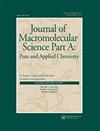Recent advances in flame retardant polymers via thiol-ene click chemistry
IF 2.4
3区 化学
Q3 POLYMER SCIENCE
Journal of Macromolecular Science Part A-Pure and Applied Chemistry
Pub Date : 2023-11-10
DOI:10.1080/10601325.2023.2280237
引用次数: 0
Abstract
AbstractWithin the toolbox of click chemistry, the utilization of thiol-ene reactions for polymer synthesis and modification is a current area of intense attention. Thiol-ene click reactions are used for a broad range of applications. One main area that needs particular attention, where thiol-ene click reactions are immensely employed, is the fabrication of coatings. Especially, when light is used to trigger the thiol-ene reactions, coatings can be prepared within seconds. This method is known as thiol-ene photopolymerization (TEP) and it is a marvelous advancement among light-induced crosslinking systems. TEP is a powerful tool for the preparation of coatings. The synthesis of phosphorous monomers for TEP has prominent importance for improved thermal properties and flame retardancy. Here, the existing literature on flame retardant TEP systems and reactive phosphorous monomers used in TEP are summarized. This review mainly highlights the studies on thermosets yet some linear polymer examples are also included. While this mini-review focuses mostly on TEP, relevant works involving other thiol-ene polymerization routes (i.e. thermal thiol-ene polymerization) rather than photopolymerization are presented. Finally, studies that utilize thiol-ene click reactions to synthesize phosphorous monomers and flame retardants are also given.Keywords: Thiol-ene clickthiol-ene photopolymerizationflame retardantphosphorusnitrogen AcknowledgmentsThis paper is dedicated to the memory of Prof. Atilla GÜNGÖR. The author would like to thank all colleagues and group members who have contributed over the years.Disclosure StatementThe author declares no conflict of interest.通过巯基化学研究阻燃聚合物的最新进展
摘要在化学的工具箱中,利用巯基反应合成和修饰聚合物是当前备受关注的一个领域。巯基点击反应的应用范围很广。需要特别注意的一个主要领域是涂料的制造,在这个领域中,巯基点击反应被大量使用。特别是,当光被用来触发巯基反应时,涂层可以在几秒钟内制备出来。这种方法被称为硫烯光聚合(TEP),是光诱导交联体系的一个了不起的进步。TEP是制备涂料的有力工具。合成用于TEP的含磷单体对改善TEP的热性能和阻燃性能具有重要意义。本文对现有的阻燃TEP体系和用于TEP的活性磷单体进行了综述。本文主要综述了热固性聚合物的研究,同时也介绍了一些线状聚合物的例子。虽然这篇小型综述主要集中在TEP,但涉及其他硫醇-烯聚合途径(即热硫醇-烯聚合)而不是光聚合的相关工作也被介绍。最后,介绍了利用巯基键合反应合成含磷单体和阻燃剂的研究进展。关键词:巯基,巯基,光聚合,阻燃,磷氮,致谢本文是为了纪念阿提拉教授GÜNGÖR。作者要感谢所有的同事和小组成员谁贡献了多年。声明作者声明无利益冲突。
本文章由计算机程序翻译,如有差异,请以英文原文为准。
求助全文
约1分钟内获得全文
求助全文
来源期刊
CiteScore
4.60
自引率
16.00%
发文量
61
审稿时长
3.1 months
期刊介绍:
Journal of Macromolecular Science, Part A: Pure and Applied Chemistry (JMS-PAC) is a necessary resource for academic and industrial scientists and engineers whose interests center on both synthetic and naturally occurring polymers and their applications.

 求助内容:
求助内容: 应助结果提醒方式:
应助结果提醒方式:


